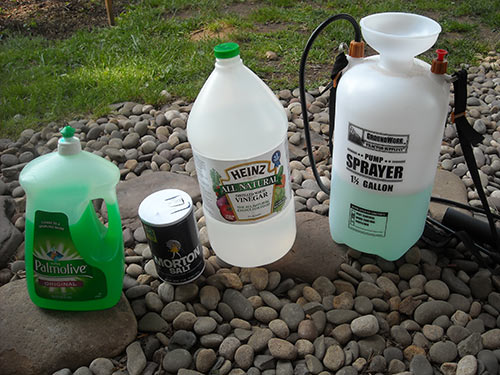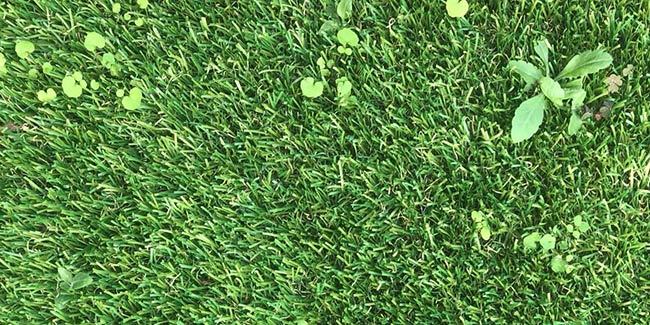Horticultural Vinegar : The New Weed Killer on the Block
Vinegar is often touted as an effective homemade weed killer - hint, hint (it's not really). The active ingredient in regular malt or "white" vinegar is acetic acid, whilst it is kind of effective against some smaller weeds, they will grow back and it's ineffective against deep rooted weeds.
Horticultural vinegar has become very popular in recent years, this so called "vinegar" contains upto 30% sometimes even 40% acetic acid. It is sold as a safer, more natural alternative to Glyphosate, Triclopyr and other commercial weed killers.
But is it really all it's cracked up to be? How does horticultural / agricultural vinegar compare with the most powerful weed killers that have been around for decades?

What is horticultural vinegar?
It's a bit of a misnomer to actually call this stuff vinegar - it's not, it's acetic acid. You cannot add to to chips, you cannot pickle things in it and I would certainly not advise you consume it in anyway - it will burn your insides away.
Agricultural vinegar is just acetic acid and usually water / the by products that remain from purifying vinegar, sometimes it is even made synthetically whereas regular vinegar is brewed!
Typically it comes in concentrations ranging from 20%-40% acetic acid. The higher the concentration, the more effective it will be / the quicker it will work.
How does it kill weeds?
Like all acids, horticultural vinegar burns away the vegetation that it comes into contact with. Typically you spray it onto the weeds and within a few days they will burn away.
Ever seen a movie where someone gets dissolved in acid? It's the same thing except this acid isn't quite as strong as that and obviously its for plants.

Before 1
What is the difference between horticultural vinegar and regular vinegar?
Regular vinegar you buy from the shops contains upto 5% acetic acid, this gives it the bitter, zingy, sour taste - horticultural vinegar contains upto 10x as much acetic acid.
The difference is: agricultural vinegar is much much stronger and not for human consumption - don't put it on your chips and it certainly won't make your crisps taste any better.
Is it effective?
In a way, yes, it is quite effective at killing weeds.
Shallow rooted weeds will quickly succumb to the acid and melt away, deep rooted weeds are also vulnerable but because horticultural vinegar is a contact weed killer it doesn't effect the roots. It will only kill the parts of the plants you directly apply it to.
Weeds such as Ivy, Dandelions, Horsestail, Brambles and other deep rooted perennials will be damaged by acetic acid but unless they are small and weak, they will regrow.
Is it better than RoundUp?
RoundUp is very controversial and countries around the globe are trying to use less of it whilst they figure out if it's safe (it is) but Glyphosate is a highly effective weed killer that kills ALL kinds of weeds.
Horticultural vinegar is nowhere near as effective against as many weeds as RoundUp and there have been studies that suggest it's actually more of a health risk than RoundUp.
"Rats fed equal amounts of RoundUp and Acetic acid, the rats with the Acetic acid died much quicker and with lower doses"
Source: https://fairfield.osu.edu/news/vinegar-it-%E2%80%9Csafer%E2%80%9D-herbicide
Yes really - Agricultural vinegar may be worse health wise and less effective than Glyphosate.
Glyphosate (RoundUp) vs Horticultural vinegar
It is truly commendable that you want to use less Glyphosate but the companies selling agricultural vinegar are jumping on a bandwagon - it's just vinegar, it's a home made weed killer, IT'S SAFE, they scream - it's not & it's nowhere near as effective either.
These 20-40% acetic acid "vinegars" are just that, they are acid, sure they will burn away plant materials but they won't kill the tough weeds and they are just as dangerous if not more so than many commercial weed killers.

Agricultural Vinegar vs RoundUp : Face Off
(Round 1) : Effectiveness
Glyphosate is systemic, meaning it is absorbed and transplanted throughout the whole plant including the roots. Horticultural Vinegar is contact based meaning it only kills the parts of the plants it physically touches.
Round 1 winner: Glyphosate (it kills the weeds and the roots!)
(Round 2) : Soil & Environment
Neither of these products are fit for human consumption and great care should be taken when applying any herbicide. Glyphosate binds tightly to the soil meaning there is very little chance of it leaking into surrounding environment, neither does it affect soil health.
Agricultural vinegar is acid based meaning it can wreak havoc with you soil PH levels, this may affect plants growing nearby. It will also "disinfect" your soil harming the beneficial microorganisms living there and insects like worms and beetles won't like it much either.
Round 2 winner: Glyphosate (it's so far proven to do less damage to soil & environment)
(Round 3) : Cost Effectiveness
At the time of writing this in 2023, you can get a large 5 litre bottle of agricultural vinegar for roughly £25-30, this is best used undiluted but you can dilute it by 1 part water, 1 part acetic acid. Roughly 10 litres for £25-30.
Glyphosate on the other hand you can buy a 1 litre bottle for roughly the same price (£25-30) this will make over 50 litres of very strong weed killer. This varies from manufacturer to manufacturer but at the time of writing it is roughly correct.
As you can see horticultural vinegar is 5 times more expensive than Glyphosate!
Not only is it more expensive but you will require more treatments when compared to Glyphosate making it even more expensive.
Round 3 winner: Glyphosate (it's cheaper!)
The Winner Is?
Obviously Glyphosate based weed killers such as RoundUp are better than acetic acid. They are stronger, they kill more kinds of weeds, they last longer & are more cost effective. However horticultural vinegar does have some advantages over RoundUp:
- It's organic so can be used in settings where you need to use organic chemicals (growing organic foods for example).
- It works faster. As it's acid based it gets to work right away, in good conditions you may see results in as little as 2 days, Glyphosate does take a while to work as it must be absorbed.
- It can be used against Glyphosate resistant weeds. Overuse of RoundUp can cause weeds to become immune to it, this isn't a problem for agricultural vinegars.

Will it kill weeds permanently?
When applied to shallow rooted weeds such as daisies, grasses, chickweed & purslane it will kill them permanently - it may also kill young perennials if you apply it in time (before they get big)!
Due to it's contact only nature horticultural vinegar is much less or totally effective against deep rooted perennials such as Ivy, Brambles, Marestail, Bamboo etc - don't waste your time applying acetic acid against these types of weeds, it will just cause frustration.
How long does horticultural vinegar take to kill weeds?
Applied in the correct conditions (warm & dry) you should start to see the weeds die within 2-7 days, it may take upto 10 days for them to completely die.
Great caution should be taken we applying around plants you wish to keep. Agricultural vinegar is non selective, it will harm any plant that it touches.
Should I dilute horticultural vinegar?
You should always read the manufacturers guidelines when using herbicides. Typically you can dilute horticultural vinegar when the acetic acid concentration is above 30%.
Diluting the acetic acid will make it work more slowly / less effectively.
Will it kill tough weeds?
Your mileage will vary depending on what the tough weeds are...
Horticultural vinegar will damage all kinds of plant life but it doesn't kill them all.
It may work on some "tough weeds" like nettles, Thistles & Docks but hardier, viney or woody bushes will be almost impossible to kill with agricultural vinegar.

Can I use it in my lawn?
If you can apply it very, very accurately - grasses are easily killed by agricultural vinegar and so are most lawn weeds, spray even a little on some grass and it will die.
Grass can also be sensitive to sudden adjustments in PH levels - increasing PH levels can invite other types of lawn diseases and pests such as moss, harming the overall health of your lawn.
If you want to kill your lawn weeds there are much better alternatives such as Dicamba and 2-4,D that won't harm your grass and are much more effective against common lawn weeds in the UK.
Will grass grow back?
Sadly, no, once you have applied agricultural vinegar to your lawn the patches that die won't grow back and despite common beliefs - grass doesn't spread, it will die you you'll have bare patches that will need repaired, for that you'll need a fast growing grass seed.
What are the risks?
One of the major advantages of horticultural vinegar is that it doesn't have as big a risk profile as other herbicides - please don't think it's entirely safe, there are still some risks:
- It can damage your eyes if it comes into contact with them.
- It may cause skin irritation or "acid burns" if not rinsed off immediately.
- It alters soil PH which can harm ornamental plants you wish to keep.
- If sprayed directly onto insects, it is harmful.
Is it safe for pets, dogs and children?
Yes but please keep pets & children out of the treated area until the solution has dried. Accidental drift may come into contact with eyes, or if your pets have a penchant for eating weeds they may accidentally ingest the solution - definitely not recommended.
How long does agricultural vinegar stay in the soil?
As long as you use it according to the manufacturers instructions the only damage you will do to the soil is affect the PH levels - horticultural vinegar doesn't bind to soil and is washed away in the rain - it's also not toxic to aquatic invertebrates.
Prolonged dry periods may result in the acetic acid remaining in the soil, affecting PH levels even more - not so much of a worry here in the UK when rain is never to far away.
Closing thoughts
The rise of horticultural vinegar AKA Acetic acid in the UK came just as the controversy of Glyphosate grew - it is commendable that you are looking for a safer, organic weed killer - we should all use much less of these garden chemicals.
However agricultural vinegar is just another chemical and as a weed killer it is much less effective and more costly than tried and tested commercial weed killers.

What is the best weed killer to kill dandelions for good
Glyphosate works really well against dandelions but be sure to get them before they spread!